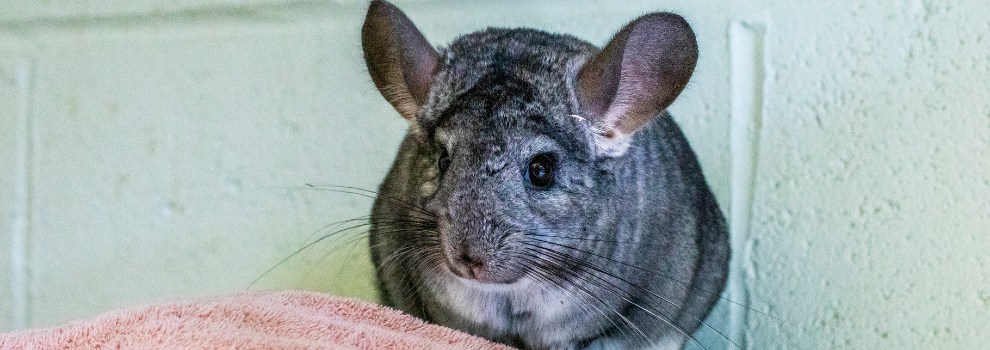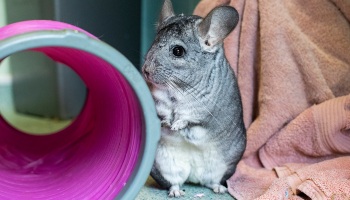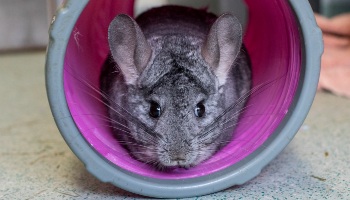Chinchillas are athletic
They have long, strong hind limbs adapted for leaping, and a tail that makes up about one-third of their body length. They can jump over six feet (1.8m) in height, and pet chinchillas have been reported to jump onto the top of refrigerators!
Chinchillas are highly social
In the wild, they live in colonies of over 100 individuals. Therefore they must not be kept singly as pets.
Chinchillas communicate vocally
Chinchillas are generally quiet animals and communicate through a variety of soft high-pitched grunting noises. They produce hiccupping noises, chirps, squeals and barks which act as social messages to other chinchillas.
Chinchillas hear like us
Chinchillas have large ears and sensitive hearing. Their hearing range is similar to that of humans. They are easily startled by sudden loud or unfamiliar sounds.
Chinchillas need a high-fibre diet
Wild chinchillas eat leaves, stems, bark and seeds. Captive chinchillas need a high-fibre diet based on grasses and hays. Their teeth grow constantly, so they need to eat lots of hay, which is abrasive, to help wear their teeth down.
Chinchillas feed in the early morning and late evening, but should have access to food 24 hours a day. They eat by sitting on their haunches, holding the food in their forepaws.
Chinchillas have an unsual digestive system
Like rabbits and guinea pigs, chinchillas perform a digestive process called caecotrophy to extract as much goodness as possible from their food. Food is passed through their gut and special droppings (called caecotrophs) are produced. Chinchillas eat these droppings, so they absorb and digest them again.
Chinchillas sleep in the daytime
Chinchillas are nocturnal, meaning they're most active in the evening and at night. Chinchillas do not burrow, but live in rock crevices or holes in the wild. As a result, chinchillas will sleep while squeezed into very small spaces. They usually sleep upright in a huddled position, but will also sleep on their sides and can even sleep upside down!
Chinchillas are adapted to living in mountains
Wild chinchillas are adapted to living in rock crevices or holes at elevations over 4000m. Their red blood cells can take up more oxygen than other rodents or rabbits, which helps them survive at high altitudes.
Chinchillas have exceptionally dense fur which is an adaptation to the cold temperatures they are exposed to in their native environment. Each hair follicle has 60 to 90 individual hairs emerging from it; humans typically have one hair per follicle!
Hairless fleshy footpads allow chinchillas to be agile and maintain their grip on rocky surfaces.
Chinchillas are prey animals
Chinchillas are prey animals and their natural response to a perceived threat is to freeze or cower, and dart for cover. In captivity they will often try to wedge themselves into a tight space for protection, mimicking their natural behaviour to seek cover in rock crevices.
Chinchillas are able to lose large patches of fur – a process called ‘fur slip’. This is a defence mechanism against predators, which results in the predator being left with a tuft of fur while the chinchilla escapes. Fur slip can also occur in captivity due to inappropriate handling.
Understanding your chinchilla's needs
Chinchillas have only been kept as pets since relatively recently, and experts are still learning about how best to care for them. There's no single 'perfect' way to care for chinchillas, as long as you meet their needs.
Read our expert-reviewed pet care information to find out more about the needs of chinchillas, including their environment, diet, behaviour, company and health and welfare.
Adopt a chinchilla from the RSPCA
If you'd like to welcome chinchillas to your home, why not find chinchillas for rehoming from the RSPCA?




